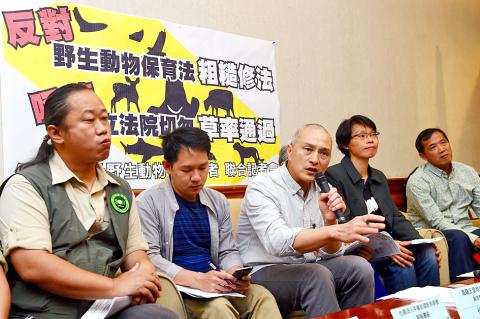A coalition of conservation groups yesterday condemned draft amendments to the Wildlife Conservation Act (野生動物保育法) that would allow Aborigines to hunt protected animals for self-use or non-profit purposes, which the groups said could be used as an excuse for commercial hunting.
The existing law allows Aborigines to hunt wildlife for cultural or ritual purposes on a case-by-case basis; the amendments, which the legislature’s Economics Committee proposed on Friday last week, would broaden the scope to legalize “self-use” or “non-profit” hunting by applying for a permit beforehand or submitting a report after the hunt.
Conservationists also criticized proposed amendments that would allow farmers to “deal” with crop-destroying animals and ban snare traps made with powerful springs, but not other types of snares.

Photo: Chien Jung-fong, Taipei Times
“The definition of self-use is too fuzzy and can be used as an excuse for commercial hunting and animal trade. Who is to decide what are crop-destroying animals and how are we to deal with them? Can crop-destroying animals be traded?” Environment and Animal Society of Taiwan chief executive officer Wu Hung (朱增宏) asked.
“With all due respect to Aborigines and Aboriginal traditions, hunting can damage the fragile wildlife population ... The situation will worsen given a market economy and modern hunting gear,” National Pingtung University of Science and Technology Institute of Wildlife Conservation director Hwang Mei-hsu (黃美秀) said.
Showing snares made with a wire noose and photographs of Formosan black bears with missing paws, Hwang said modern traps are too destructive and indiscriminate, and not part of Aboriginal traditions.
Hwang, who is also the honorary president of the Taiwan Black Bear Conservation Association, said eight of 15 Taiwan black bears she studied in 2000 had been injured by snare traps, and yet they continue to face the same threat.
She called for a complete ban on all kinds of traps and for the government to fund and launch a nationwide wildlife census to understand wildlife population and the effects of hunting.
“There is no opposition between Aborigines and conservationists. What we all want is a sustainable environment in which humans and animals can live in harmony,” she said.
Marine conservation group Oceanus Honors Gaia deputy director Lin Yu-kai (林于凱) said that conservationists respect and support Aborigines’ rights to self government and preserving tradition, but that should not compromise wildlife conservation.
“If hunting can be carried out on a reporting basis without approval in advance, how can hunting activities be monitored?” Lin asked.
Meanwhile, the committee discontinued the review of a draft bill on animal release practices.
Chinese Wild Bird Federation deputy director Chen Te-chih (陳德治) said many wildlife transactions were conducted solely to support the religious practice of releasing animals, which has caused mass deaths and could damage the ecology and biodiversity as released animals might be invasive species.
The groups urged lawmakers to reconsider the draft amendments and not to revise the act until further negotiations.

Japanese footwear brand Onitsuka Tiger today issued a public apology and said it has suspended an employee amid allegations that the staff member discriminated against a Vietnamese customer at its Taipei 101 store. Posting on the social media platform Threads yesterday, a user said that an employee at the store said that “those shoes are very expensive” when her friend, who is a migrant worker from Vietnam, asked for assistance. The employee then ignored her until she asked again, to which she replied: "We don't have a size 37." The post had amassed nearly 26,000 likes and 916 comments as of this

US President Donald Trump said "it’s up to" Chinese President Xi Jinping (習近平) what China does on Taiwan, but that he would be "very unhappy" with a change in the "status quo," the New York Times said in an interview published yesterday. Xi "considers it to be a part of China, and that’s up to him what he’s going to be doing," Trump told the newspaper on Wednesday. "But I’ve expressed to him that I would be very unhappy if he did that, and I don’t think he’ll do that," he added. "I hope he doesn’t do that." Trump made the comments in

Tourism in Kenting fell to a historic low for the second consecutive year last year, impacting hotels and other local businesses that rely on a steady stream of domestic tourists, the latest data showed. A total of 2.139 million tourists visited Kenting last year, down slightly from 2.14 million in 2024, the data showed. The number of tourists who visited the national park on the Hengchun Peninsula peaked in 2015 at 8.37 million people. That number has been below 2.2 million for two years, although there was a spike in October last year due to multiple long weekends. The occupancy rate for hotels

A cold surge advisory was today issued for 18 cities and counties across Taiwan, with temperatures of below 10°C forecast during the day and into tonight, the Central Weather Administration (CWA) said. New Taipei City, Taipei, Taoyuan and Hsinchu, Miaoli and Yilan counties are expected to experience sustained temperatures of 10°C or lower, the CWA said. Temperatures are likely to temporarily drop below 10°C in most other areas, except Taitung, Pingtung, Penghu and Lienchiang (Matsu) counties, CWA data showed. The cold weather is being caused by a strong continental cold air mass, combined with radiative cooling, a process in which heat escapes from